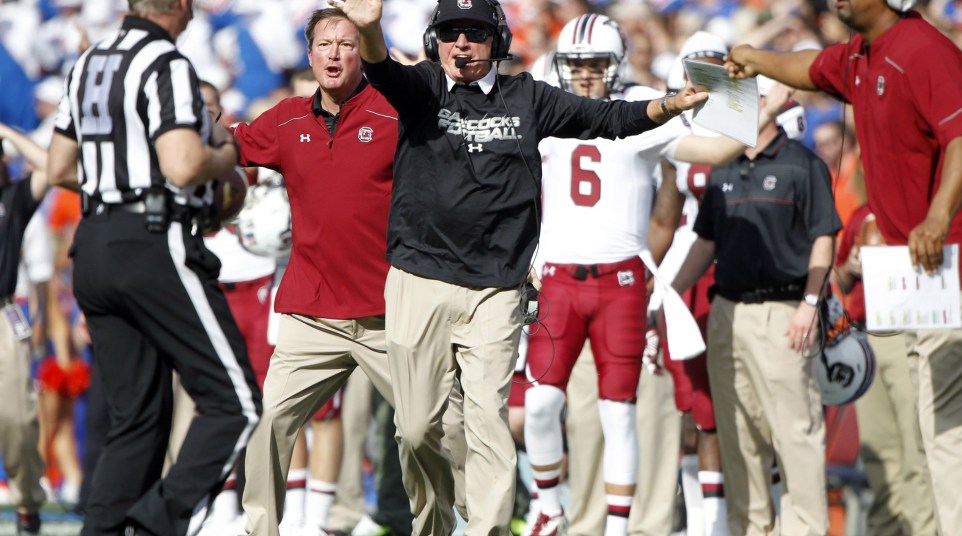Week 12 questionable calls: Officials skunk fake punt
With six SEC games that looked like great matchups on paper, the officiating crews faced another difficult task with lots of crucial calls Saturday.
Luckily, a couple of the obvious misses in big games did not affect the outcome. Both Georgia and South Carolina overcame bad calls to win the game. There’s going to be at least a few missed calls each week — the officials are as human as the players — but it’s nice when the misses don’t ruin games.
Two SEC players got ejected due to targeting, which remains a topic of intense discussion among fans, players and coaches. The rule, designed to make the game safer for offensive and defensive players, makes logical sense. On Saturday, officials applied it correctly in two cases.
But from the point of view of the defenders, who are making split-second decisions while trying to forcibly ram some of the country’s best college athletes to the ground, it’s a bad beat at times.
What about you? Which calls on Saturday got your blood boiling?
STINGY OFFICIAL VOIDS THRILLING FAKE
Trailing 7-0 in the first quarter, Georgia executed what looked to be a well-designed fake punt. Punter Adam Erickson hit an uncovered Shakenneth Williams for about a 41-yard gain to set up first-and-goal. But the officials said guard Brandon Kublanow (No. 54) advanced more than three yards downfield.
The replay clearly shows the ball resting just inside the 45-yard line pre-snap. Kublanow stops short of the 42-yard line, probably intentionally, before the ball hits Williams’ hands before running downfield.
Bill Lemonnier, the ESPN rules official expert present as part of the broadcast, agreed that the penalty shouldn’t have been called.
Georgia punted on the next play, and though the Bulldogs went on to win 34-7, the team didn’t take a lead until about midway through the second quarter.
PHANTOM BLOCK IN THE BACK
Trailing 17-10 in the fourth quarter, South Carolina running back Mike Davis managed a 10-yard run to midfield for a first down.
But receiver Shaq Roland edged up behind cornerback Vernon Hargreaves III, drawing an illegal block penalty. Roland extended his hands, and it’s tough to tell from this angle, but he may have grazed the back of Hargreaves III’s jersey.
It doesn’t appear there was enough contact to warrant a penalty. That’s a very difficult call, and we can’t tell the vantage point at which the official viewed the play either.
It didn’t cost South Carolina, as Davis converted a subsequent third-and-2. The Gamecocks didn’t score on the drive, but won the game in overtime.
FUMBLE OR TOUCHDOWN?
In a scene all to familiar to Alabama fans in the last three years, one of its running backs — this time Derrick Henry, not T.J. Yeldon — fumbled at the goal line, failing to secure a 19-0 lead past the midway point of the second quarter.
Replay reversed the call. Extrapolating bits of information from several replay angles, we surmise that Henry held the ball in front of his chest at the time he advanced the farthest and that his helmet definitely crossed the goal line. Therefore the ball probably did as well.
The officials got the call correct on review, but it’s difficult to see that Henry indeed crossed the plane of the end zone on any one replay angle.
A PAIR OF TARGETING EJECTIONS
Tennessee defensive back Brian Randolph got ejected for drilling a sliding Patrick Towles in the head on a dangerous tackle very early in the third quarter Saturday.
The officials got the call correct, but it’s one of the more frustrating rules in college football. No one wants to see the kind of hit that Randolph dished out be part of college football, though, and this was pretty textbook targeting. Now Randolph, who returned an interception for a touchdown in the game, will miss the first half of next week’s Missouri game.
Likewise, Arkansas safety Rohan Gaines faced an ejection after a targeting call while defending LSU tight end DeSean Smith in the third quarter of the Razorbacks’ 17-0 win. He’ll now miss the first half of Saturday’s game against Ole Miss.
Gaines sprinted to close on Smith, who turned just as the pass fell incomplete — spinning his head right into Smith’s chest. The collision was hard and by rule should be a penalty.
Smith definitely qualified as defenseless, but Gaines didn’t seem to intentionally target his head. Pulling off before the collision may have been possible, but that’s a very difficult decision to make at full speed.


